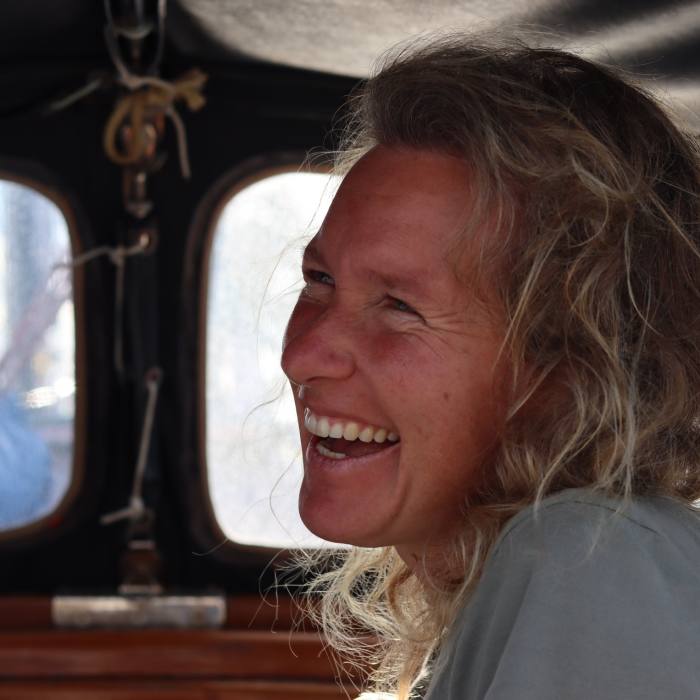‘I’m drifting around somewhere near the equator, but I don’t know exactly where because it’s overcast, so I haven’t managed a sun sight for three days, and I haven’t seen any wind for a week. Sailing without wind is about as much fun as skiing without snow.” It was March 29 and after 206 days alone at sea, South African yachtswoman Kirsten Neuschäfer was suffering a touch of the doldrum blues.
Normally a glance at the GPS would pinpoint a sailor’s position, but the retro Golden Globe competition tries to emulate the conditions of the original 1968-69 race, when Robin Knox-Johnston relied purely on compass, sextant, speed log and dead-reckoning to become the first person to sail single-handed nonstop round the world. So no GPS, no autopilot, no internet weather forecasts and no boat longer than 36 feet.
The original Golden Globe Race was a huge media event, attracting a colourful cast of misfits and dreamers. One of them, Bernard Moitessier, declined a chance of winning, deciding instead to continue sailing round the world indefinitely, “because I am happy at sea, and perhaps to save my soul”. After running into difficulties another competitor, Donald Crowhurst, reported false positions then disappeared, in an assumed suicide (a story dramatised in the 2017 film The Mercy, starring Colin Firth and Rachel Weisz).
Over the next half-century, ocean racing transformed into a ruthlessly professional high-tech industry, with team budgets for some events routinely exceeding £10mn. When the Australian yachtsman Don McIntyre inaugurated the first re-run of the Golden Globe Race in 2018, his aim was deliberately nostalgic, “to recreate the Golden Age of solo sailing”. “It’s not about having the latest technology: there is still a huge element of the unknown, a sense of adventure and a big element of luck,” says Neuschäfer.

A satellite phone is one of the few concessions to modern technology and I was forbidden to tell Neuschäfer that she was actually in the lead. Round the world races are usually wars of attrition and this one (only the third Golden Globe, after 1968 and 2018) is no exception. Out of 16 entrants who set sail on September 4 2022 from Les Sables d’Olonne on the French coast, only five are still in the race and two of those have been demoted to “Chichester Class” because they were forced to stop for repairs. (Francis Chichester’s 1966-67 solo circumnavigation included a stopover in Sydney). Earlier this month, British sailor Ian Herbert-Jones was rescued by a Taiwanese fishing boat in the southern Atlantic after his yacht was rolled and dismasted in a storm.

At the time of writing Neuschäfer remains in the lead, but Indian sailor Abhilash Tomy is only about 50 nautical miles behind — both are on course to arrive back in Sables d’Olonne on April 29, after 237 days at sea. People are suddenly taking notice of the only female entrant, previously unknown in the world of professional race sailing, and wondering why she has done so well.
Like most ocean sailors, she started on small dinghies — in her case on lakes near her home in Pretoria — but the experience that really set her apart was a land journey. At the age of 22, after a spell in Europe, she arrived in southern Spain, intending to bicycle all the way from Morocco to the Cape of Good Hope. Before wheeling her bike on to the Strait of Gibraltar ferry she had a moment’s panic. “I looked across at the mountains of Morocco and remembered all the warnings from the doom and gloom merchants about a woman alone in Africa. But then I reminded myself that none of these people had actually done it. So I decided at least to go and have a look and just take it one step at a time.”
Of course there were scary moments on that 9,000-mile solo journey — like being snatched off the streets of Kinshasa by “policemen” who robbed all her cash at gunpoint — but she prefers to remember the endless kindness of strangers.


Back in South Africa she took up ocean sailing and worked delivering yachts. In 2015, she started working for renowned yachtsman Skip Novak, crewing and then skippering on his expedition boats in Arctic and Antarctic waters. I sailed with her aboard Novak’s Pelagic Australis on two voyages to South Georgia and, like everyone, was struck by her calm, quiet competence, whether it was reefing the mainsail or cooking an exquisite roast dinner for 15 people. At anchor on South Georgia, she thought nothing of swimming several hundred metres across the bay in a sea temperature perhaps one degree above freezing, then skiing over the mountains, in a blizzard, on a pair of ill-fitting boots and borrowed old skis. One day, on the return voyage to the Falklands, unusually for her, she looked really ill. When I suggested hesitantly that she might ask one of the others to take over her watch, I got very short shrift.
That same resilience has characterised her Golden Globe campaign. She found a suitable boat, 36-foot Cape George cutter built in 1988, for sale in Newfoundland, and was intending to sail it south to Bermuda for a comprehensive refit. Lockdowns made that impossible and she only made it as far as Prince Edward Island near Nova Scotia. When she arrived in January 2021 the rigging was dangerously iced up and she only just made it into harbour before the sea froze over. Minnehaha, named after a character in “The Song of Hiawatha”, could go no further.
Local ship repair man Eddie Arsenault recalls meeting Neuschäfer on the dock. “I asked, ‘do you need a hand?’ and she said, ‘I think I do’.” Minnehaha was jacked up in a shed and work started in earnest. “Once we lifted the deck we opened a can of worms,” says Arsenault. “There were lots of days where we discovered new problems and at one point I was convinced Kirsten was going to have to go to a big shipyard. But she’s a tough cookie, she was laser-focused on what she wanted and we just kept our heads down, grinding away.”
“We” included a gang of local tradesmen, charmed and inspired by the lone sailor’s palpable determination. Neuschäfer paid what she could, but Arsenault and his friends put in hundreds of hours of unpaid work, their handicraft recorded on the Facebook page Neuschäfer had agreed reluctantly to open. They organised a big fundraising dinner. Friends and followers round the world began donating money, supplies and pieces of vital equipment.
Skip Novak, veteran of five round-the-world races, was initially sceptical about his former employee’s lack of specific racing experience — in fact this is her very first professional competition — but is the first to applaud her consummate seamanship. Earlier in the race Tapio Lehtinen from Finland had just five minutes to escape to his life raft when his boat sank inexplicably. By chance, it was Neuschäfer who was closest and came to rescue him, before transferring him to a passing cargo vessel.

“I don’t get lonely when I’m doing something I really want to do,” she told me over the sat phone. Pushed to confess to any bad times, she admitted that black mould from weeks of condensation inside the unheated cabin had been pretty depressing. She had also been frustrated by a broken spinnaker pole. “It meant I couldn’t take the fast course I wanted to. That was really frustrating. But it also meant that I missed sailing into a huge storm, so I was actually quite lucky.”
What about sleep deprivation, I asked? “Oh, I have had some long sleeps — up to six hours. But in busy shipping lanes or anywhere near land, I have to sit up awake, just closing my eyes for maybe 20 minutes at a time.” (One competitor, Guy deBoer, missed a fishing boat in the Bay of Biscay by five metres and then ran aground in Fuerteventura). What she really wanted to talk about though, were the good times, like the thrill of sighting a land feature on Tasmania after weeks of celestial navigation in the Indian Ocean, “realising I was right there, exactly where I thought I was.”
Despite the broken spinnaker pole in the southern Pacific, she was first round Cape Horn and then got a huge morale boost as she sailed past the Falklands and all her friends in Stanley motored out to wave her on her way back up the Atlantic.
As she closes in on the French coast, on the other side of the ocean in Prince Edward Island, Eddie Arsenault is delighted. “It’s pretty rewarding to see she’s doing so well. One thing we agreed on right from the start of the refit, was that we were only going to work on a winning boat.”
For live updates see goldengloberace.com
Credit: Source link












